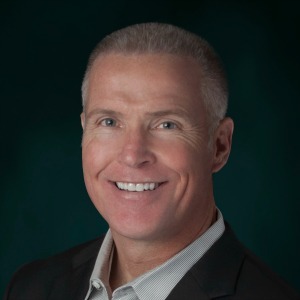CEO Chat With Eric Pratt, Taqua
Light Reading founder and CEO Steve Saunders talks with Eric Pratt, the CEO of Taqua.

I recently popped down to Texas to chat with CEO Eric L. Pratt about his company, Taqua.
It's an outfit with a backstory that Light Reading can relate to. Like LR, Taqua went through an unsuccessful acquisition (in Taqua's case, by Tekelec, in 2005), but emerged from it in a spin-out that left it stronger (better than it was before; better, stronger, faster).
Today, Taqua has carved itself out a nice, profitable, growing business selling specialist technology that allows service providers to seamlessly connect cellular networks over WiFi (emphasis on seamless).
Figure 1:  Taqua's Eric L. Pratt: "We've got to leverage
Taqua's Eric L. Pratt: "We've got to leverage
what we do better than anybody in the world, and
that's voice and messaging."
Taqua is one of a number of interesting mid-size companies that are emerging in the next gen comms market that have found way to achieve success by creating unique, pragmatic solutions that solve distinct business problems for carriers (another example is NetNumber).
Read on to get the 411 on Taqua's solution, and to hear why Istanbul might not be such a great venue for corporate events after all.
— Stephen Saunders, Founder & CEO, Light Reading
Stephen Saunders, Light Reading: Tell the Light Reading audience a little bit about yourself and your company.
Eric Pratt, Taqua:If you look at the last 17 years of our company, it would be very easy to bore people to tears with a year-by-year account of what we've done and what we've accomplished. But from a high-level perspective, you have a company that started in digital switch replacement that grew from zero to, gosh, probably $20 million of projected revenue and was then acquired by Tekelec in 2004 for $94 million dollars. And then from there, within Tekelec, we went from digital switching into VoIP, and even though the Tekelec experience really didn't work, from a technology standpoint, Tekelec invested $50 to $60 million into Taqua to be able to convert digital switching into packet switching, or VoIP. And then in 2007, we had an opportunity for an MBO for the entire division.
SS: What precipitated that opportunity?
EP: The experiment that Tekelec went through to transition into switching just wasn't successful. Their board was looking at it and saying: we're making a lot of money in one arena and we're investing in this arena and it's not producing in the timeframe that we want to produce so we want to do something else.
So there were a few opportunities for them to go to the incumbents to sell the company and it didn't work out. We thought Taqua was always a diamond in the rough -- both people and technology -- and we were able to spin that out as an independent play.
Our whole objective was to take a very viable team and technology in digital switching and VoIP. But we also knew that the gateway also had wireless codex. So we also had what we knew we needed for an entrée into wireless.
SS: Yeah, it was a big play waiting to happen, right?
EP: Exactly.
SS: So you had your future strategy built in.
EP: Yes.
SS: Did the wireless codex pre-date the Tekelec takeover or was that part of their $50 million investment?
EP: It was part of the investment that was made. If you think about the last 17 years, we went from digital switching to VoIP to IMS, with the whole objective of being able to transition into not just VoIP or traditional wireline but also wireless. So for the last eight years, we've really focused on a particular area of the industry that is primarily voice and messaging. And you sit there and say OK, where's the money in voice? Is it going to be free in the future?
We believe that there's an opportunity for us to be able to focus on an area of IMS that we're very good at. Being a component within IMS but being very, very good at it is something that is part of a bundled service that is required -- specifically TAS [telecom application server] -- in an IMS arena.
I'd love to be able to tell you that in 2007 we knew how that was going to transition into voice-over-WiFi, but that would be a lie. We knew we needed to get in wireless. We knew we needed to take advantage of the gateway type of infrastructure. And we knew we needed to take advantage of the intelligence that we had in that arena. So we transitioned, in revenue terms, into almost 100% hardware and VoIP wireline into what is now probably 75% wireless and software.
SS: You still make some money from the VoIP stuff as well?
EP: Yes. It's part of the brand. It's a part of the way that we've transitioned the company.
Next page: The customer profile
SS: What is the customer profile now?
EP: From both a revenue and a margin standpoint, I guess the majority of the business is now wireless and wireless MNOs. What we have is we have an ability, with our combination core software and also client software, to be able to provide a service that is completely seamless between 3G cellular and WiFi.
The big difference between what we're doing versus over-the-top type of applications is that we provide Sprint, for example, and their customers with the ability to walk straight from a cellular type of coverage area into WiFi and utilize their existing phone number, their existing voicemail box, all of their existing services under WiFi.
SS: How do you do that?
EP: That opens up another conversation of what we do differently from the incumbents. The incumbents traditionally provide infrastructure for 3G as well as IMS and LTE. And they do a very good job. But it unintentionally sometimes forces carriers and operators to upgrade their entire infrastructure to IMS.
What we give them the ability to do is utilize, for example, a 3G voice infrastructure that is very successful and from a QoS standpoint is probably second to none. But then also to be able to evolve into and utilize LTE data and other services under WiFi, together.
What we have is the ability to transition, because we have a TAS that also works in CDMA in an environment that is 3G and also works with 3G PP standard in WiFi -- it gives us the ability to do both.
It's been literally years of investment that's given us this ability.
SS: Doesn't Ericsson have a competing product to what you're doing?
EP: Obviously they have much more money and they have many more people. You sit there and say: oh, how can we compete? We have to do things that are standards-based but that are standards-based in a way that we believe that carriers will like, that use the fact that in our area of expertise we're second to none. We've got to leverage what we do better than anybody in the world, and that's voice and messaging. Ericsson is actually teaming with us.
SS: I was going to ask you if you had some relationships like that. Is Ericsson the only one?
EP: It's not. Most of the major vendors in the space either use our wireless gateway or utilize our clients, or utilize our core infrastructure because they haven't put the time and energy into that particular area and they've also noticed the fact that we’ve done it a little bit better than anybody else has.
We've basically built our business like a home budget, where we spend the money we make. When we started off, we had 125 customers. We had an annuity stream. Those customers wanted to evolve into a wireless and other applications and they helped support our transition into that. So we've been profitable for years. And we're building it for the long haul and we're doing it in a way where we continue to do things that others can't.
EP:We can now walk into any wireless carrier around the globe and say: "Look, we can offer a voice-over-WiFi capability for all devices utilizing your existing infrastructure."
This is a really important point because the rest of the industry is saying: if you want to do voice-over-WiFi, you need to buy all these IMS components. What we’re saying is you've already spent millions of dollars on the infrastructure you have in place. If you plug in our software you are going to expand the reach of your cellular coverage, and you're going to do it in a way that's not over-the-top. It's not Skype, or WhatsApp. It's integrated, so your customers are going to use your existing phone numbers, your existing voice mailboxes.
SS: That's huge, yes.
EP: And the other market is with the MVNOs [mobile virtual network operators]. Now that we have a complete service under WiFi, it opens up the opportunity for carriers that were strictly a sales and marketing agent of some other wireless carrier service to be able to control the voice and text messaging data when their customers are under WiFi; it's now under their control.
Next page: Changing industry
SS: What's going on with the cable operators and their voice strategies? Is that something where you see a lot of activity? You have cable companies as customers, is that right?
EP: Yes. We're obviously under NDAs with pretty much all of them. It's a delicate conversation because it goes back to how the industry is changing. I'm fascinated to see the predictions that by 2018 there will be substantially more voice-over-WiFi calling than voice-over-LTE calling. Probably 80% to 85% of my calls that I make on my cellular device are at my home or in the office, primarily the office. The amount of time that I'm under cellular coverage is probably 15%.
So I truly believe in the ability to utilize all the services under WiFi in a seamless setting. We're enabling that to happen before voice-over-LTE is pervasive by using existing network infrastructure, the native dialer, and native text messaging in WiFi. That is exciting because, like I said, it goes to what we haven't talked about. We talked about MNOs, we talked about MVNOs, and now think about the enterprise. So Fortune 100 companies, for example, the ability for us to provide them with a downloadable client that they could download and allow voice and text messaging -- not unlike data offload -- all over their infrastructure or a hosted provider. That's something that's changing the industry.
SS: What happens when 5G gets here? Because it's not going to be that long, right? Five years. That's either a long time or it's a blink of the eye in our industry. When you think about 2000, it doesn't seem like that long ago. It's actually 15 years, which is pretty frightening when you think about it. Three kids ago, for me. I measure things in children, obviously.
EP: Somebody in my position can lose sleep at night trying to understand how we can continue to offer the differentiators that we offer today five years from now. We've got 65% of the company or more that is development. We're constantly working on both the tactical demands of our existing customers and looking at what's coming with standards and how we can play in that arena.
Next page: People are key
SS: What is the deal with this telecom corridor here? What's the historical reason why there's so much comms and telecoms in Texas?
EP: If you think about it, Nortel started here and -- North America-wise -- so did Fujitsu, DSE, Alcatel…
It's been an outstanding area to get really good people at a really good price. We've worked very hard to build a company. One of the things that we did differently with the company is that because we didn't go down the traditional route when we spun out in 2007, we were able to give a large percentage of the company to every employee in the company. I was looking at the numbers before you came here, and I think our retention rate is about 97% amongst people we started with, and we continue to build, and going from 38 people to 130 people.
SS: Cool.
EP: Yeah, it is.
I love what you guys are doing with BTE, by the way.
SS: Thank you. We're probably going to rebrand it as a communications event next year because the term "telecom" was very useful to us for the first couple of years but there’s generally an acknowledgement that telecom is turning into a next-generation communications market, and pulling in things like enterprise, utility, municipality, lots of vertical industries, IoT, security -- it just makes a lot of sense.
We're going to do a cruise for the Executive Summit [in December 2015], by the way. We wanted to go to Cuba but the politicians left it too late.
EP: Cuba. Now see, that would be cool.
SS: Yeah, well maybe next year. But you've got to time it right. You don’t want to go there after it's been ruined by the owners of the Vegas casinos. I'm sure Steve Wynn will destroy Cuba as a quality destination it in the next five years. It'll be horrible. We were thinking about going to Istanbul [for the Executive Summit] but we got a lot of negative responses.
[A Taqua marketing exec who has been sitting in on the interview silently until this point now chips in on the relative merits of Istanbul.]
Marketing Executive: Isn't that where bombs and stuff went off? I don't know, man. Istanbul? I'd be worried about you.
SS: Really?
Marketing Exec: Yes.
SS: I've been there a lot. I think it's pretty safe. You're more likely to be in a football riot than a bombing in Istanbul. They like a good riot there but they usually leave the Westerners out of it. It's either football or they had the thing over the park, the public park which they couldn't use so the whole city rioted. They're very riotous people but very entertaining. Have you ever been there?
EP: No.
SS: Oh, it's great. It's just like two huge cities with a bridge in between. It's literally like here's the west, here's the east, here's the river, here's your bridge, between the two, welcome, can I sell you a rug? The bridge has got all these shops and restaurants on it. It's just a crazy, crazy place.
About the Author(s)
You May Also Like




_International_Software_Products.jpeg?width=300&auto=webp&quality=80&disable=upscale)







